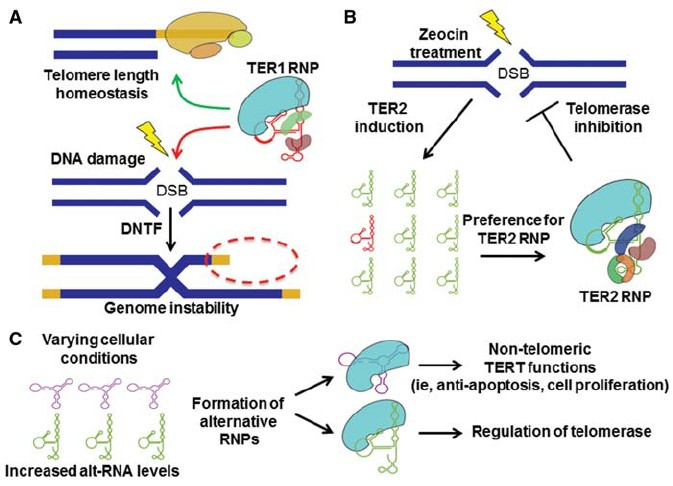Plant telomeres are the protective ends of chromosomes that shorten with each cell division. Analysis of plant telomere dynamics and stress responses involves studying how telomeres change in response to various environments. In recent years, there has been a growing interest in understanding the dynamic nature of telomeres and their response to different stress conditions.
 Fig. 1 Telomerase regulation in response to genotoxic stress. (Nelson AD and Shippen DE., 2012)
Fig. 1 Telomerase regulation in response to genotoxic stress. (Nelson AD and Shippen DE., 2012)
As a leading biological specialist, Lifeasible offers a competitive advantage in analyzing telomeres and their response to stress in plants. Our expertise in molecular biology, genomics, and bioinformatics allows us to conduct comprehensive studies on telomere dynamics and stress response mechanisms.
In addition to telomere shortening, we deeply understand exposure to stress leading to telomere depletion, i.e., loss of telomeric DNA sequences. Telomere depletion can occur through mechanisms such as exonucleolytic degradation or aberrant recombination events. It has been observed that chronic exposure to stress conditions can lead to a gradual decline in telomeric DNA content.
At Lifeasible, our state-of-the-art facilities and highly skilled scientific team enable us to provide precise and reliable results that contribute to understanding telomere biology and stress tolerance in plants. If you are interested in our services or have some questions, please feel free to contact us or make an online inquiry.
Reference
Lifeasible has established a one-stop service platform for plants. In addition to obtaining customized solutions for plant genetic engineering, customers can also conduct follow-up analysis and research on plants through our analysis platform. The analytical services we provide include but are not limited to the following:
Get Latest Lifeasible News and Updates Directly to Your Inbox
Adaptive Evolutionary Mechanism of Plants
February 28, 2025
Unraveling Cotton Development: Insights from Multi-Omics Studies
February 27, 2025